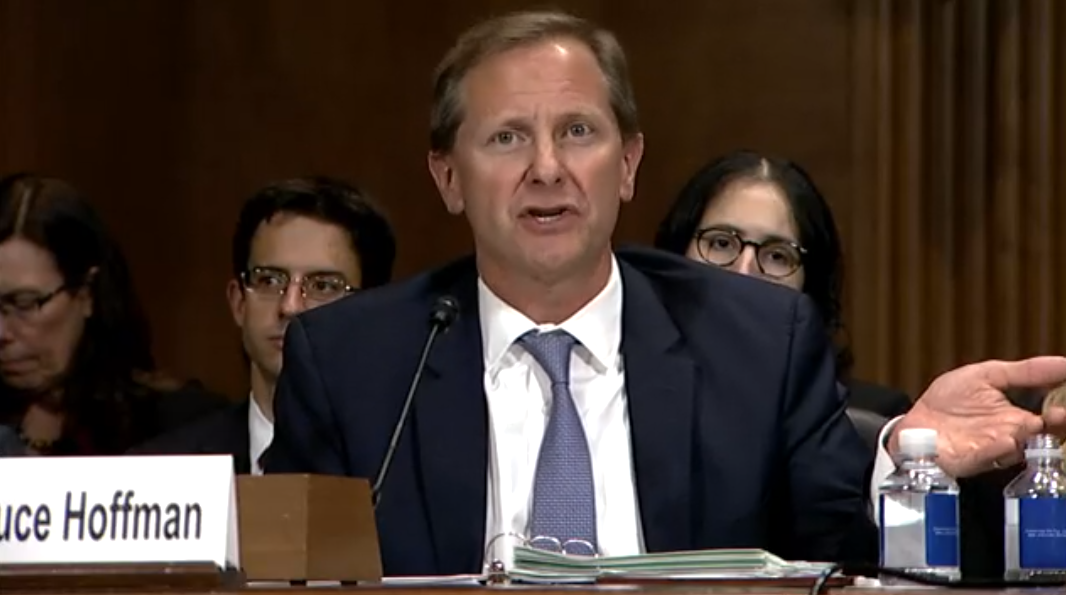Big Tech: Senate Drills Down on Potential Serial (Innovation) Killers
The smarter way to stay on top of the multichannel video marketplace. Sign up below.
You are now subscribed
Your newsletter sign-up was successful
The Senate Antitrust Committee heard from various parties Tuesday (Sept. 24) on whether Big Tech companies have been allowed to become serial innovation killers, buying up tech start-up competitors before those competitors are large enough to raise red flags with regulators.

An FTC witness said the agency was definitely retrospectively reviewing such "killer acqs" (acquisitions), and could break up or shake up already-merged companies if that is the appropriate structural remedy.
"The latest round of technology-driven disruption, instigated in significant part by digital platforms, has caused some to question whether our competition laws and enforcement approaches can continue to protect consumers from anticompetitive conduct and mergers in fast-paced markets characterized by technological change," said witness Bruce Hoffman, director of the FTC's Bureau Of Competition (pictured above). The FTC has created a tech task force to look answer that question.
But he also suggested the FTC is aware of the potential to buy up to monopoly. "[T]he Commission pays particularly close attention when an industry leader seeks to acquire an up-and-coming competitor that is changing customer expectations and gaining sales," he said, including when the relevant product is data.
Diana Moss, president of the American Antitrust Institute, suggested antitrust enforcement has been weak and more attention needed to be paid to mergers "that are not reportable under the HSR requirements and smaller, reportable transactions that are likely to fly below the antitrust radar."
Patricia Nakache, general partner with venture capital firm, Trinity Ventures, warned that if the government is too heavy handed in preventing established firms from buying start-ups, it could hurt innovation. She pointed out that an incumbent company could acquire a company "for its technical talent, for a new product that it can sell to existing customers, or to enter an entirely new business." She said in those situations, "the government should not seek to stifle or slow those transactions."
Venture capital firms are more likely to invest in a serial entrepreneur's next big idea if he has a track record of starting up a business then selling it to a large incumbent.
The smarter way to stay on top of the multichannel video marketplace. Sign up below.
Sen. Mike Lee (R-UTah), chairman of the committee, said that over-enforcement is not a "cost-free" proposition." He conceded that some mergers may be for antiompetitive reasons, but because they can't see the future, it is difficult to predict in advance which deals should be blocked--Instagram, for example, versus some similar effort that does not gain traction.
Witness Professor John Yun, of the Antonin Scalia Law School at George Mason University said he did not think there has been a systematic government bias for allowing Big Tech to buy up to dominance
Hoffman agreed that he did not see any data that showed such systematic bias. He said the FTC is looking to see if there were some transactions that should have raised flags, but didn't.
Sen. Amy Klobuchar (D-Minn.) said the hearing was prompted by lack of agency action on start-up purchases. Moss said her institute looked at 700 mergers by the Big Five tech firms, with only one of those challenged. She said factors in underenforcment is that agencies have not been creative in applying the tools they have.
Hoffman agreed with Klobuchar that his agency could use more funds while facing adversaries with unlimited resources.
Klobuchar asked if Yun retrospective reviews of mergers would be helpful. He said yes. Asked which mergers should be looked at again, he said, yes: Facebook/Instagram/WatsApp.
Moss argued that while business so consumer deals have gotten all the attention, the "big swaths" of serial acquisitions are not in social media, but data analytics, AI, cloud computing, and other B2B transactions that she said have been "flying under the radar" and need to be looked at.
Hoffman said retrospectives are useful, but are not transaction-specific. He said the FTC is also looking at specific past transactions where they may not have gotten it right.
Sen. Josh Hawley (R-Mo.), one of Big Tech's biggest critics, told Hoffman he planned to send a letter to the FTC asking it to release the rest of a 2012 report on Google, half of which was made public, the other half not.
Sen. Richard Blumenthal (D-Conn.) and Hoffman agreed that some of the tech issues they were discussing sounded and looked like the kinds of anticompetititive practices in the Microsoft antitrust case. Blumenthal pointed out he was a key player in that Microsoft investigation. One of the Microsoft remedies was interoperability, and not just internet browers.
He said since he saw the same anticompetitive practices in big tech, he asked Hoffman if the FTC should be seeking interoperable mandates. Hoffman said the short answer was "yes." Its remedies in monopoly or retrospective merger cases were very broad.
Moss said interoperability promotes consumer switching and allows rivals to operate on a platform without fear of discrimination, but she said it could be hard to implement and structural remedies, like break-ups, are the most effective remedies, and the easiest to enforce.
She said she was heartened by the FTC tech task force, but has yet to see any cases coming out of that investigation.
Contributing editor John Eggerton has been an editor and/or writer on media regulation, legislation and policy for over four decades, including covering the FCC, FTC, Congress, the major media trade associations, and the federal courts. In addition to Multichannel News and Broadcasting + Cable, his work has appeared in Radio World, TV Technology, TV Fax, This Week in Consumer Electronics, Variety and the Encyclopedia Britannica.

